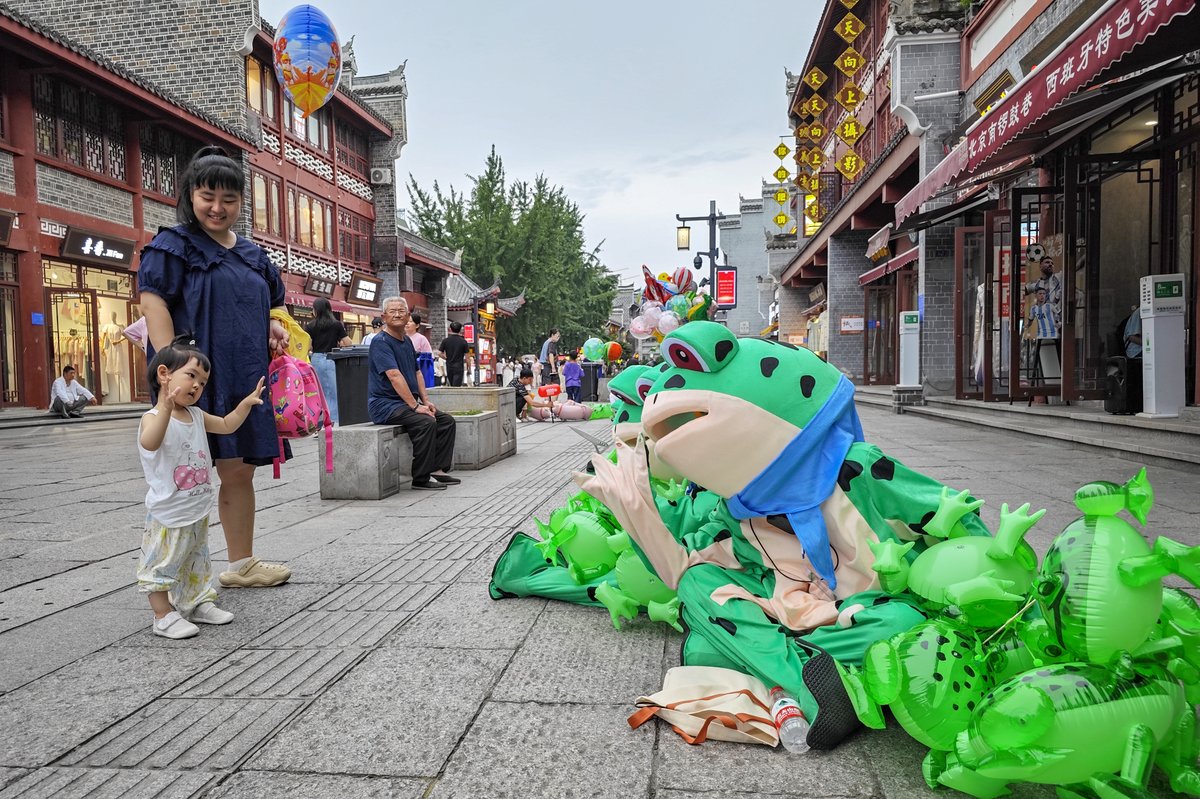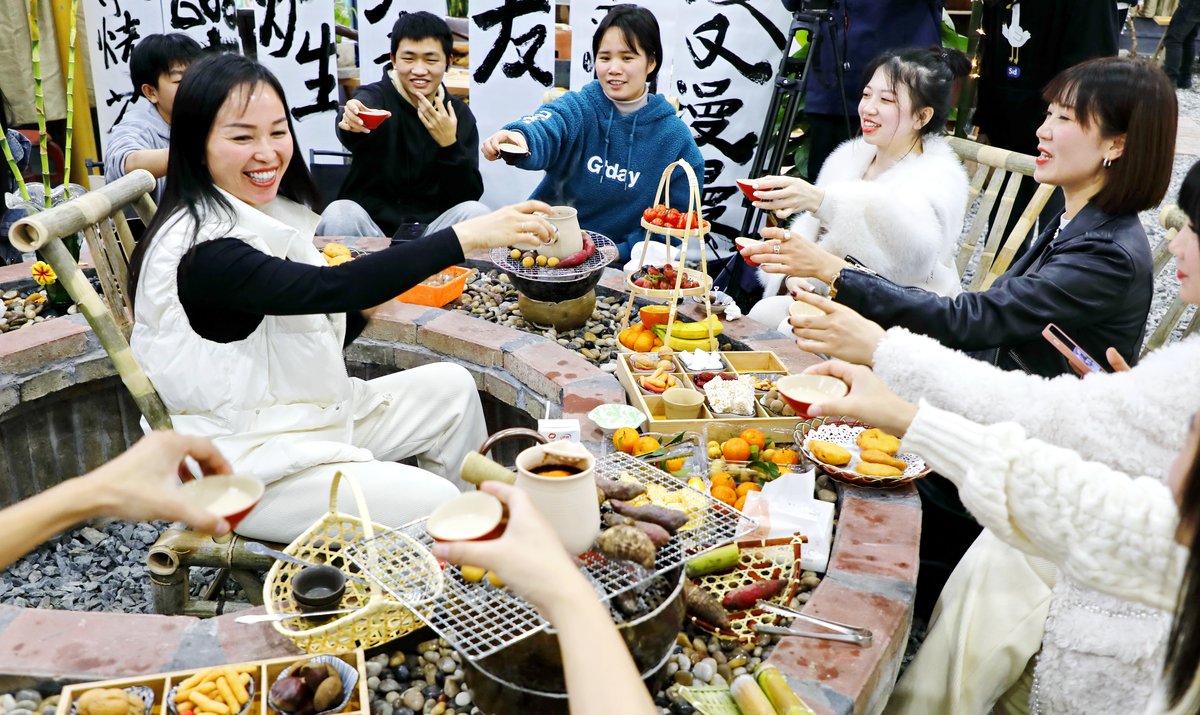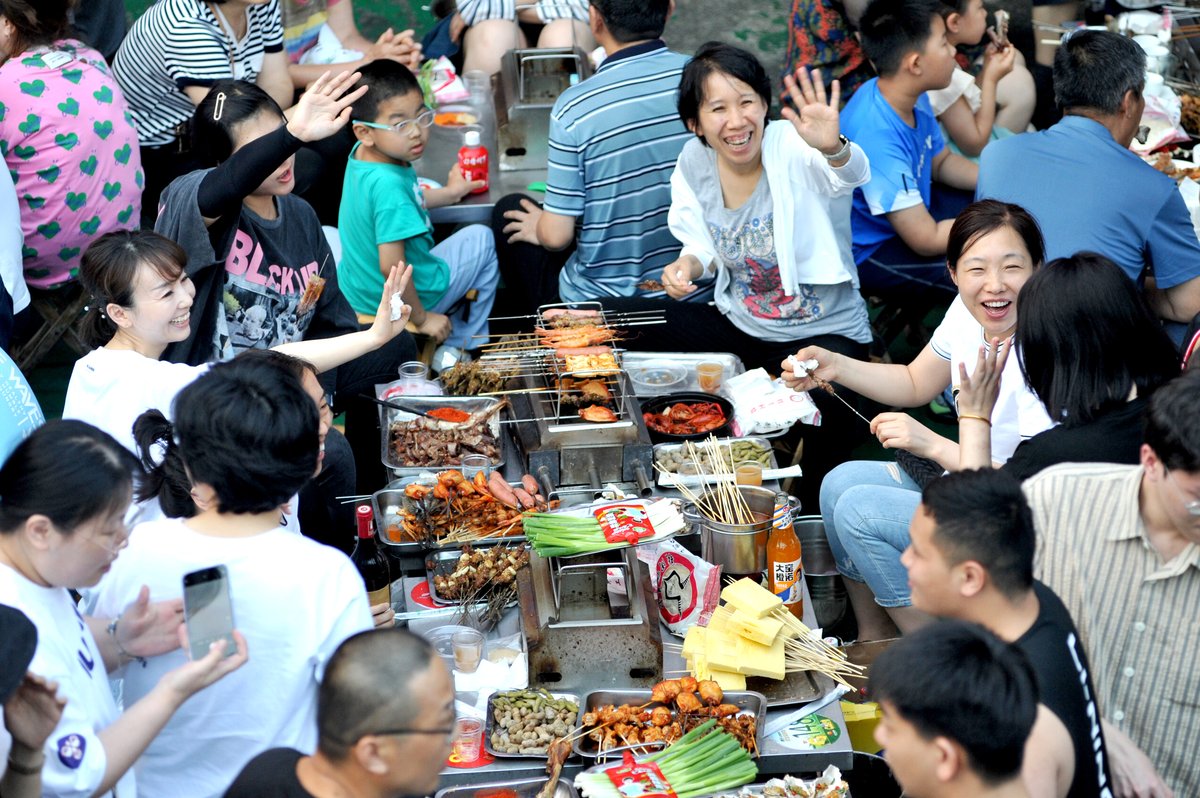Five popular trends that swept China’s internet this year
From an invasion of people dressed in frog costumes to quirky street cuisine; from obsession with ancient rituals to cramming for modern exams, China has witnessed a variety of new trends in 2023. With the year ending, we look back at some of the most popular cultural trends that shaped society over the past 12 months. Here are five that caught TWOC’s eye:
Sad frogs invade the streets
Depressed frogs selling their babies (known as 卖崽青蛙 in Chinese) popped up across China in 2023, much to netizens’ amusement, and the chagrin of some local authorities. People dressed in green frog outfits and selling small balloon frogs have added color to streets around the country, offering salutes to passersby and providing great material for gifs.
Like so many internet memes, it remains a mystery how the frog trend originated. A 32-year-old former teacher surnamed Tong from Nanjing, Jiangsu province, is credited with inventing this sad-looking character, but since then, the amphibian has multiplied and the internet is now teeming with discussions about people donning the costume, and whether they are cute or pose a public nuisance.
Some heartbreaking tales of the people inside the costumes have circulated—elderly workers or people with disabilities trying to make money from selling balloons, and a girl being bullied for dressing up in the costume. Others are just out there to promote the opening of businesses or even just for fun. Who knows what the next costume of choice will be for hawkers in 2024?
Old traditions revived
Old traditions gained new traction in 2023, including, the ancient pastime of tea drinking, which roared back into fashion with young Chinese. Weilu zhucha (围炉煮茶, literally “boiling tea while sitting around a stove”) has become a popular pastime for the country’s youth. The ritual, a reenactment of an ancient practice, involves gathering to chat or play games over tea and roasted snacks. This has become big business for thousands of teahouses looking to jump on the viral trend.
Similarly, traditional Chinese medicine (TCM), once shunned by the young, has made a comeback. While purists advise these medicinal drinks should be consumed hot and unadulterated for maximum efficacy, sweetened and chilled TCM drinks have now become all the rage. For health-conscious youngsters, enjoying a cup of suanmeitang (sour plum juice) or herb-infused coffee is seen as a health-enhancing antidote to the pressures of modern life.
Another traditional drink also became fashionable with youth: baijiu. The fiery liquor, normally made from sorghum, had been a staple with middle-aged male businesspeople, but has now grown popular with younger drinkers. Kweichow Maotai, one of China’s oldest baijiu brands, even launched a baijiu-infused coffee drink collaboration with drinks chain Luckin Coffee. Luckin claimed they sold 5.42 million cups of the mash-up drink on its first day of sale in September.
Viral travel on a budget
Zibo, a small city in Shandong province, blew up on social media as a holiday destination for mainly young Chinese obsessed with the city’s signature barbecue food.
The food is simple—meat skewers, hotdogs, pancakes—and can be found in many places across China, yet millions of young tourists still flooded the city in summer 2023. The city’s virality allegedly grew after university students quarantined in Shandong during the pandemic returned to the city to celebrate after China dropped its Covid-19 restrictions. Their social media posts helped spread the word about the affordability and abundance of Zibo barbecue joints. The deluge of tourists helped boost the economy, but also caused a host of problems for locals whose town suddenly became clogged with visitors.
Many young people who visited Zibo were swept up in a broader trend of budget- and time-conscious “special forces style tourism (特种兵式旅游).” Tourists fly in and fly out of their destinations in the shortest time possible, visiting all the major sites in quick succession while saving money on accommodation expenses. One 30-year-old man surnamed Zhang from Sichuan province, took the trend to an extreme by climbing China’s “Five Great Mountains” in just five days, with a budget of 4,000 yuan, over this year’s Labor Day holiday.
Personality testing
The classic Myers-Briggs Type Indicator (MBTI) personality test swept the Chinese internet this year. People took the test and proudly declared their results using acronyms (ISTJ, for example), then invented memes to describe what people with each personality type are like.
MBTI measures four dimensions of personality to determine someone’s preference for introversion (I) or extroversion (E), sensing (S) or intuition (N), thinking (T) or feeling (F), and judging (J) or perceiving (P).
Netizens have nicknamed ENFPs, who are supposedly outgoing, spontaneous, creative individuals, “happy puppies (快乐小狗),” while their introverted adjacent (INFPs) are known as “little butterflies (小蝴蝶).”
Ambitious independent thinkers (INTJs), may want to think twice before dating a warm and sociable ESFJ, at least according to Chinese netizens’ reading of the test.
Fruitful dogs
Many netizens were only just getting used to taking meticulous care of their cardboard pet when that trend became so 2022. The latest craze on social media mandates adopting a furry mango dog instead.
There’s no need to visit any stray dog shelters, though. Lonely people can simply head to their nearest supermarket and grab a pack of fresh mangoes, to eventually use the fluffy core inside as a pet. The cleaned, dried seed becomes a fluffy yellow companion, with many netizens decorating their mango dogs with cute canine faces on them.
Who knows what inanimate object will be netizens’ pet of choice in 2024?















